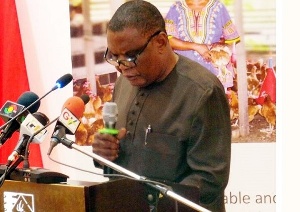 Dr. Gyiele Nurah, Minister of State at the Presidency
Dr. Gyiele Nurah, Minister of State at the Presidency
As a policy direction to help revamp the local poultry industry, government has restricted the importation of frozen chicken drastically, Dr. Gyiele Nurah – Minister of State at the Presidency in charge of Food and Agriculture – has announced.
The ‘ban’ on imported frozen chicken, he indicated, is in response to the cry of domestic poultry actors that the trade practice is one of the major challenges ‘collapsing’ the local poultry industry.
Excessive importation of frozen chicken as well as high costs of production have been the bane of local poultry production. According to the Ghana National Association of Poultry Farmers (GNAPF), over 135,000 metric tonnes of frozen chicken was imported from the European Zone to Ghana in 2017 – representing a 76% increase over 2016 imports; the 2017 frozen chicken imports constituted about 112 million birds.
The minister however hinted that government will not hesitate to reverse the import restriction on frozen chicken if local producers are unable to meet the demand of the market, thereby urging local poultry producers to redouble their efforts to address the artificial shortage.
“Now that we have reduced importation of frozen chicken, domestic producers must be prepared to feed the people. But if we see that it is not working, then we have to reverse it – because government has the responsibility to feed the people as well as support local poultry producers.
“Ideally, government would want to feed the consumers with locally-produced chicken. Local producers must cut themselves away from the era of marketing birds with feathers to marketing processed birds and chicken meat products, including sausages and barbecue. We must develop value chains that will make all the difference in our earnings from the poultry industry. And the time to begin to do that is now,” he stated.
Dr. Nurah was addressing the opening session of the 2nd Poultry Value Chain (POVAC) fair held in Sunyani. The two-day fair was organised by the Ghana Poultry Project (GPP), Assist Management in Poultry Layer Industry by Feed Improvement and Efficiency Strategy (AMPLIFIES) and GNAPF.
The 2018 fair, supported by the United States Department of agriculture (USDA) and other partners attracted hundreds of actors along the poultry value chain for deliberations under the theme ‘Employment Creation Along the Poultry Value Chain: The Public Private Partnership Approach’.
The minister said government will not relent in its effort to transform the poultry industry into a beacon of economic empowerment and development. “While government will roll out specific interventions to support the smallholder local poultry sector, the Planting for Food and Jobs campaign takes into account reducing the cost of feed inputs which form more than 60% of poultry production costs.”
The National Chairman of GNAPF, Victor Oppong Adjei, urged government to devise more prudent policies that will cushion growth and development of the local poultry industry along its value chain. He said the poultry industry is positively impacting the economy of many countries across the globe, and Ghana can take a cue from countries like Nigeria and Ivory Coast.
The Netherlands Ambassador to Ghana, Ron Strikker, underscored the importance of attending to all critical variables, such as provision of quality and competitive inputs, in creating an enabling environment to boost local poultry production. He pledged the Dutch government’s commitment to assist Ghana with expertise in repositioning the country’s poultry industry.
He said: “We hope to continue working with the GPP team to do utilise trade opportunities that exist in terms of knowledge transfer and innovative technology in poultry production and processing. This is through business-to-business, matchmaking, and trade missions”.